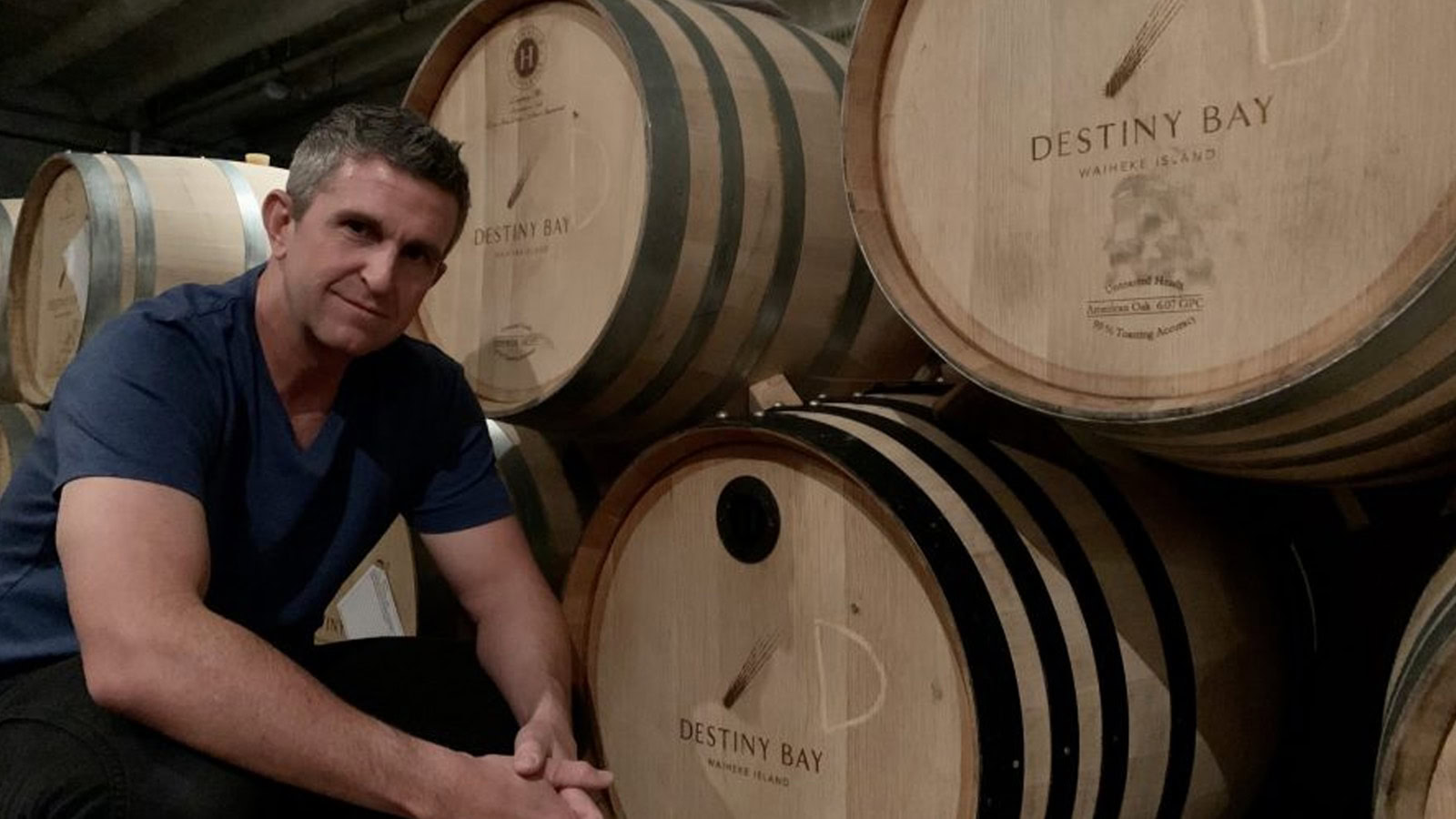In this thought-provoking episode of Uncorked, Polly Hammond talks with Sean Spratt, owner and winemaker at Destiny Bay, a small-production winery located on Waiheke Island. The conversation spans two decades of brand building, family-driven innovation, climate pressures, and what it means to operate at the luxury end of a market that isn’t always comfortable with ambition.
Destiny Bay is best known as New Zealand’s first true super-premium wine brand—and now, as one of the only Kiwi producers listed on La Place de Bordeaux.
A family business, built with intention
Destiny Bay’s story starts with an unexpected twist: Sean’s parents, Mike and Anne Spratt, relocated to New Zealand from the US with no plans to start a winery. They simply fell in love with Waiheke Island. But that “let’s plant a few vines in the backyard” idea quickly turned into one of New Zealand’s most acclaimed Cabernet blend producers.
With a microbiologist mother and a marketing-savvy father, the foundation was already set. Sean studied winemaking through UC Davis and built a deep technical knowledge of viticulture and winemaking. But he credits much of the vineyard’s scientific rigor to his mother, who earned her Master’s in Wine Science at age 60.
Interventionist non-intervention
Sean describes Destiny Bay’s approach as “interventionist non-intervention.” In other words, do all the precision work up front so that, in the winery, the grapes can speak for themselves.
This ethos means meticulous vineyard management, minimal manipulation, and a focus on letting the land show through. “Our job,” Sean says, “is to ring-fence the things that can go wrong and then get out of the way.”
The challenge of building a quiet luxury brand
Destiny Bay has always chosen the road less traveled. No restaurant. No tasting room. No flashy tourism. Instead, they focused on direct-to-consumer, loyalty-based distribution and a product-led brand identity.
“You either want to be the best, or you want to be the cheapest,” Sean explains. “Everything in the middle is a bloodbath.”
It’s a strategy that’s paid off, albeit with its own challenges. Finding the right sales talent in New Zealand proved difficult early on, and building a luxury brand in a culture marked by egalitarianism required thoughtful positioning.
A cautious step onto La Place de Bordeaux
Destiny Bay recently became one of the only New Zealand wineries represented on La Place de Bordeaux, with its top-tier blend, Magna Praemia. It’s a milestone that reflects the winery’s global aspirations and hard-won reputation—but Sean is quick to downplay the hype. “We’re treating it like an evolution, not a revolution.”
Still, it’s a strong signal that New Zealand Cabernet blends deserve a place alongside global icons.
Adapting to climate change
While climate change has posed serious challenges for many wine regions, it’s (so far) worked in Destiny Bay’s favor. Warmer vintages have brought more consistent ripening—but also pushed budburst, flowering, and harvest a full month earlier than a decade ago.
“This year, we harvested on March 17,” Sean says. “That’s two weeks earlier than anything we’ve ever seen. It’s changing everything.”
The team is now reevaluating everything from canopy management to ripeness profiles as they adjust to this new normal.
Honest communication, not just acclaim
Despite recent accolades—including Winery of the Year from Bob Campbell MW and glowing reviews from Rebecca Gibb MW—Sean insists that critic scores are not a growth strategy.
“They’re helpful,” he says. “But they don’t sell wine the way they used to. We want to make wines that people open, cellar, and love. Not just wines that win awards.”
Destiny Bay’s vintage notes read more like journal entries than marketing copy: seasonal breakdowns, weather patterns, production choices. As Polly notes, “They’re geeky, personal, and full of story—the best kind of transparency.”
Destiny Bay may have started as a passion project, but it now stands as a blueprint for quiet ambition. In Sean’s words, “We didn’t want to be everything to everyone—we wanted to do one thing really, really well.”
Learn more about today’s guest:
www.destinybaywine.com/
www.facebook.com/destinybay
twitter.com/DestinyBay
www.instagram.com/destinybaywine/
